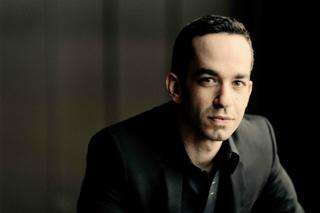|
Back
Smiles of a Squally Night New York
Theresa L. Kaufman Concert Hall
03/03/2018 -
Franz Schubert: Moments musicaux, D. 780
Avner Dorman: Two Moments musicaux
Sergei Rachmaninoff: Six Moments Musicaux, Opus 16
Inon Barnatan (Pianist)

I. Barnatan (Marco Borggreve)
Not simply from reputation but through reviewing Inon Barnatan as soloist and the splendid accompanist to Alicia Weillerstein, this Israeli-born artist is as good as they get. Terrific fingers which can do no wrong, intelligence in what he performs, a cheerful demeanor after the most arduous performance without a hair out of place...
So in last night’s concert, what could possibly go wrong? The answer: nothing. And that was the problem.
Possibly, in a curmudgeonly mood, I wanted something more last night than a cheerful lightweight program of “moments musicaux”. The title was created by Franz Schubert for works he wrote to give budding amateurs and families who had purchased a piano. Just as Sergei Rachmaninoff–before his First Symphony and nervous breakdown–called his six quick money-makers Moments musicaux (his own purse had been stolen on a train). As for composer Avner Dorman, we’ll get to him later.
Mr. Barnatan sailed through the Schubert sextet with all the smiles of a blustery March night, all the sudden vehemence and all the melodic genius required. And initially, because of two other recitals this week, it was particularly satisfying.
To explain, those were the two Schubert recitals by Mitsuko Uchida. And it wasn’t that she was better or more inferior than Mr. Barnatan. But the works she played took concentration, from audience, of course. But especially from Ms. Uchida.
Nobody “sails through” a Schubert sonata. The early ones were youthful, of course, but they were intricate, they called for sudden, even irrational measures. While the “Gastein”, and the last three sonatas were deep, dark, enigmatic. One wasn’t looking for Beethoven’s structural intricacies, but one needed to plow through the emotional paradoxes, the sudden cries and whispers.
None of that was necessary with Mr. Barnatan’s six Schubert Moments musicaux. He provided poetry in the C Major opener, he provided orchestral color (one heard an English horn) in the F Minor, he gave us a stomping walk in the last one.
Compared to the reaction to Ms. Uchida’s Schubert Sonatas over two evenings, this was child’s play. The play of a possibly naive composer and a super-accomplished young pianist, merging together for music which was both familiar and comfortable.
The Rachmaninoff Moments musicaux were written when he was barely 23 years old, composed before his ill-fated First Symphony and consequent nervous breakdown. Yet nothing of this great pianist was naive or playful. Rachmaninoff, like Botticelli’s Venus seemed to have come full-grown from birth. And while these six works are rarely played and hence unfamiliar to most of the audience, they could have been written a half-century later just before his death.
And what a technical challenge to Mr. Barnatan! A challenge which he took so easily, with such élan, such a joy of conquering the keyboard, that his mastery was almost seemed less masterful than inevitable. The first four are in the minor key, and Mr. Barantan provided a panoply of moods. The opening B-flat Minor is the longest, allowing the pianist to show how wide his emotional textures can be. The Fourth marked Presto gave Mr. Barnatan the chance for us to hear his tremendous technique. My own favorite has always been the penultimate Fifth, and Mr. Barnatan made the Adagio personal and absolutely gorgeous.
Yet these were still miniatures. About five minutes each. Marvelous miniatures from a great pianist, played by another great pianist.
In between were two Moments musicaux by the Israeli composer Avner Dorman, who I once classified as an Israeli Jacques Ibert. Whether fair or not, he has that same facility of the orchestra as he did here with this nine-minute piano work.
The second, marked Presto was indeed a tour de force, endless 16th notes up and down the piano, transmogrified into jazz, coming back to technical wizardry. And if it hardly had the miniature emotional range of the preceding Schubert, they were awarded the highest applause.
Preceding that was an Adagio of scattered ghostly notes, working into a flutter, back to the ghost again. A perfect ternary work by a highly inventive composer.
Two encores were played. One was Mr. Barnatan’s own arrangement of Schubert’s Third Moment Musical. It was clever, amiable, the kind of echt-Godovsky doodles and harmonic scribbles on the original. The second encore was another Schubert, this the third Opus 90 Intermezzo.
It was heavenly. Though one expected nothing less from Mr. Barnatan. If only one had exited the 92nd Street Y feeling that one had experienced a gourmet meal rather than immaculately prepared musical appetizers.
Harry Rolnick
|